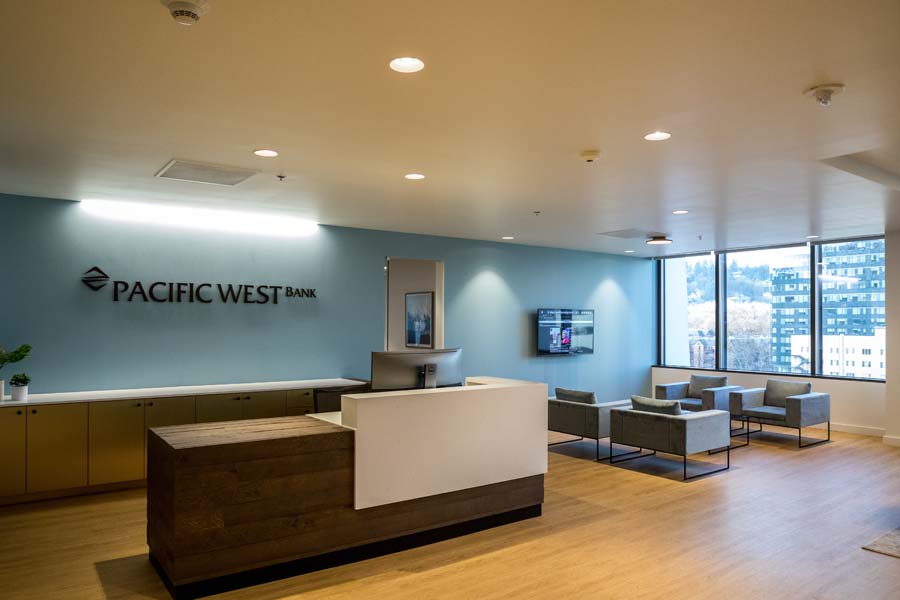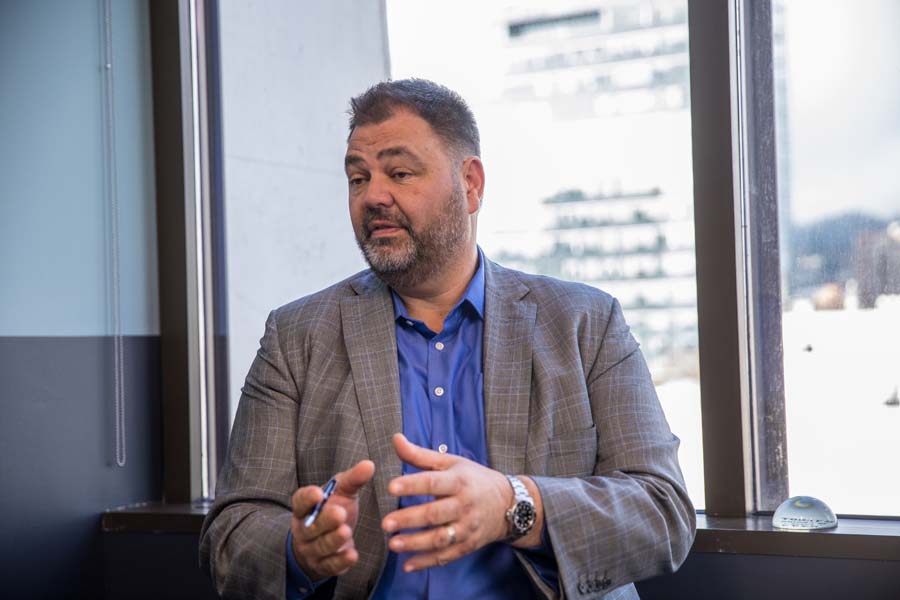Terry Peterson, CEO of Pacific West Bank, is out to prove there is still demand for a client-centric local lender in a sector dominated by large institutions.
You would be forgiven for thinking you had walked into a ritzy hotel wine bar when you enter Pacific West Bank’s new downtown Portland headquarters on the ninth floor of the Wells Fargo Center building.
A lengthy, marbled bar, blue felt stools and a sky-blue motif adorn the office with an impressive view of the city’s skyline.
Had it not been for the reception desk, wood-furnished boardroom and television screen showing the NASDAQ, you might not realize it was an office at all, let alone a bank.
In an economic era that has seen large national banks gobbling up smaller ones, the story of the small community bank, which makes up for smaller lending capacity with concierge-style service, has been largely underreported.

Reception desk of Pacific West Bank Bank. Credit Jason E. Kaplan
That has not stopped CEO Terry Peterson from sinking $1 million of his own money into Pacific West Bank, a community bank founded in 2004, which serves the Portland metro area.
“I think people want and are demanding a local company where you have access to people who make decisions,” says Peterson. “There’s a demand for people who will answer the phone and be able to give you an answer that day.”
Peterson says his experience working for local banks helped him to realize this growing demand. During the 2008 financial crisis, he unsuccessfuly attempted to turn around the struggling Westsound Bank in Bremerton, Washington.
He also served five years as president and CEO of California Bank of Commerce, which serves the San Fransicso Bay area. He became CEO of Pacific West in 2018, and doubled the bank’s total assets to $125 million in 2019. He completed a successful $27 million capital campaign in the same year.
Since Peterson took the helm of Pacific West, the bank has grown quickly. Deposits totaled $88.5 million at the end of 2019, a 55% increase over the year. But the bank has yet to turn a profit.
It posted a $910,000 net loss in 2019. The loss, according to Peterson, was due to investments in people and facilities meant to accelerate growth.
It is still a tough environment for small banks, though it is getting easier. In the wake of the 2008 financial crisis, large and midsize banks acquired community banks by the dozen.
Oregon banks were no exception. In 2006, 36 banks were chartered in the state of Oregon. Today that number has dwindled to around 13.
Jeff Rulis, managing director and senior research analyst at investment firm D.A. Davidson Companies, says that in the wake of the 2008 financial crisis, restrictions placed on banks led to the market fundamentals favoring larger banks, which were able to comply more easily.
“In the last 10 years we’ve seen a real crunch in the number of new community bank charters. As banks get larger, what occurs is that you get a demand for a more nimble, locally-operated organization,” says Rulis.
“The big caveat is that consumer behavior has changed as well. There’s an ongoing shift towards digital, and being able to reach the consumer from a technology standpoint.”
The restrictions placed on banking institutions have eased over the past few years, and the rise of digital conferencing means banks do not need to have the number of branches they once did, lowering operating costs.

Pacific West Bank president and chief operating officer Bob Harding. Credit Jason E. Kaplan
As more privately held businesses and nonprofits prosper in the Portland market, a bank like Pacific West, which provides a more personalized touch based on individual client needs, could find its niche.
“Ninety-five percent of all companies in Portland are family-owned business, so that’s where we play,” says president and chief operating officer Bob Harding.
Harding joined the team in January 2020, after serving as president of the Greater Portland market at Pacific Continental Bank, which was bought by Columbia Bank in 2017.
“Clients like a banker who isn’t just going to send them a pre-packaged deal,” says Harding. “They want someone who is going to come in and ask the right questions. There’s a real demand for people who are able to do that.”
Plenty of business clients are fed up with the impersonal model offered by big banks, says Peterson. Pacific West Bank, which makes lending decisions in hours instead of weeks, holds appeal to family-owned businesses for which time can be a deciding factor, he says.
“There are advantages to being nimble. There have been times when our bank has been competing for a deal and our ability to make adjustments at the last minute has actually won us that deal,” says Harding.
“The more you make deals like that the more the phones start to ring. We get the majority of our business when people are able to see the kind of service we can provide,” he says.
The bank’s business model is a simple: hire top-notch bankers who will bring high-quality clients with them, deliver great service and build a reputation. According to Peterson, the clients for Pacific West Bank are nearly all referrals.
“We look forward to a good, old-fashioned recession. We welcome it.” Terry Peterson, CEO, Pacific West Bank
The new bank has already attracted what Peterson views as top-quality banking talent. The CEO says bankers tend to prefer working at a smaller bank where they can have unfettered access to the CEO, and are empowered, even encouraged, to use their best judgment to make lending decisions.
“The best bankers get to choose where they want to work. Our management style is to infuse bankers with authority,” says Peterson.
“We have bankers here who view banking as a vocation. There are bankers who want to take orders, and then there are bankers who want to build businesses where they live. Those are the people whose clients follow them,” says the CEO.
Bankers at Pacific West also enjoy the freedom to contribute and share in the communities they help to build. Harding recalls a time when he and a group of bankers dropped what they were doing to do landscaping for a local family with a child suffering from leukemia. “The people here want to make a difference in the community,” he says.
It is this sort of community-building attitude that Peterson says will differentiate Pacific West from its larger competitors.
But it is said that you cannot put a price on loyalty, and one speed bump facing potential clients is their many years of staying with a larger lender.
“A lot of the arguments we hear from potential clients goes something like, ‘I’ve been with my bank for 20 years, but I’ve lost track of my banker and my banker’s boss.’” says Peterson.
“Our response is to tell them that 20 years ago it was a different bank. We ask: ‘When was the last time the president of US Bank sat down with you?’ At best you’ll get a team leader or a branch manager.”
Pacific West provides personal touches and conveniences that are unusual at larger commercial lenders. Clients can use its meeting rooms for private calls and to host video conferences.
For those clients that do not work as close to downtown, Pacific West Bank connects with them digitally, meaning they do not need a branch on every corner.
According to Peterson, the bank serves a vital, if somewhat niche, need. Instead of larger banks that focus on clients based on industry type, Pacific West takes clients it considers to be the leaders in their industries.
By industry leaders, they refer to the top 10 to 15% of clients that capture the largest share of their respective market, which have what they consider to be the most efficient business models, and which would be best situtated to survive in the event of an economic downturn.
In fact, Peterson says a recession could actually help the bank. When times are hard, he argues, the advantage goes to companies that have personalized, rapid-response service.
“If you have a good business model and you run a tight ship, a downturn can actually help,” says Harding, who says that for its clients, which are the cream of the crop in their respective industry, recessions provide the chance to negotiate new deals and roll up competition.
“We look forward to a good, old-fashioned recession. We welcome it,” says Peterson. “If a larger bank sees a recession coming they might say, ‘Oh, let’s get out of residential lending.’ But we view it as an opportunity. There’s always a way to stick with that top 10 to 15%.” he says.
The consolidation of smaller banks has not slowed, and probably will not decelerate anytime soon. But Peterson says he has no plans to sell out a larger bank.
Pacific West serves a vital, if somewhat niche, market need, going after good clients with high-quality bankers, he says. “I don’t see another bank charter being born in Oregon for the foreseeable future. But there’s no reason we won’t be around for the next 15 years.”
But the question remains how long the bank could stay local. Pacific West Bank has about 500 shareholders, and as the bank continues to grow, the prospect of selling out to a larger bank could become more lucrative, as it would mean a large payday for shareholders.
“It is more difficult to stay independent if you have significant out-of-area shareholders,” says Chris Hemmings, chief administrative officer at Summit Bank, a community bank in Eugene.
“Many of our shareholders are local business owners. It’s not that community shareholders aren’t looking to see profitable returns over time, but there’s a different perspective as to why you own the bank,” says Hemmings.
Peterson says he has the right mix of investors to keep Pacific West Bank independent. The owners, he says, are local business people and professional bank investors, who put money in the bank because they want to see Portland prosper.
“Our investors invested in Portland,” says Peterson. “This is home for us.”
This article has been edited to correct the net loss the bank incurred in 2019. Pacific West Bank reported a net loss of $910,000 in 2019. It was incorrectly reported the bank posted a $910 million net loss for 2019.








